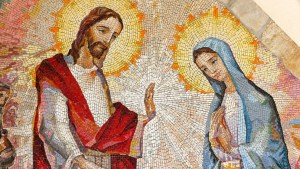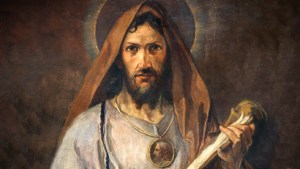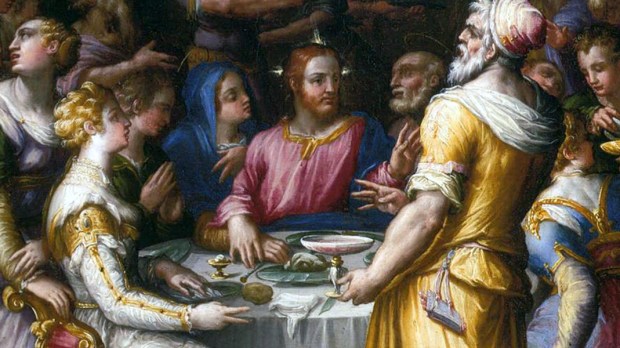He once in Cana of Galilee turned the water into wine, akin to blood, and is it incredible that He should have turned wine into blood? When called to a bodily marriage, He miraculously wrought that wonderful work; and on the children of the bride-chamber (Matt. 9:15), shall He not much rather be acknowledged to have bestowed the fruition of His Body and Blood ? – St. Cyril of Jerusalem
Why this miracle? Why at this time? St. Thomas Aquinas contends, “Christ worked miracles in order to confirm His doctrine, and in order to show forth His Divine power.” At the hour when he began to teach, he began to perform miracles.
On the third day there was a wedding in Cana in Galilee, and the mother of Jesus was there. Jesus and his disciples were also invited to the wedding. When the wine ran short, the mother of Jesus said to him, “They have no wine.” Jesus said to her, “Woman, how does your concern affect me? My hour has not yet come.” His mother said to the servers, “Do whatever he tells you.” (John 2:1-5)
This first sign in St. John’s Gospel is preceded by two important events: first Christ’s baptism and second the call of the apostles. By his baptism, Jesus first reveals publicly who he is: the Son of God. The voice of the Father and the appearance of the Holy Spirit proclaim that the savior is no mere man. The change of water into wine underscores the Lord’s divinity. He declares his power over nature when he changes the substance of water into the substance of wine. Surely the one who can accomplish this miracle can change wine into his own blood?

Read more:
Here’s why Mary is the secret for growing in faith
The disciples believe without first seeing signs. They are not called by signs; they are moved simply by faith in Christ’s teaching. For the disciples, their faith is strengthened and confirmed by signs, but not caused by it. They believe before the signs begin.
Why did Mary not ask for a sign before this hour? Mary, after all, knew who Christ was from the moment he was conceived. She bore the world’s savior. The angel had announced to her the mission of her son. She believes and then conceives. The apostles and Mary all believe before the miracles of Christ are wrought. She pondered all these things, remembering them, turning them over in her heart.
And yet, at this hour, she asks for a sign. Thomas Aquinas notes, “In Mary’s intercession, note first her kindness and mercy. For it is a quality of mercy to regard another’s distress as one’s own, because to be merciful is to have a heart distressed at the distress of another: ‘Who is weak, and I am not weak?’ (2 Cor 11:29). And so because the Blessed Virgin was full of mercy, she desired to relieve the distress of others.”
In this mystery, Mary’s intercession plays a central role. Our Lady reveals to us the confidence needed to request a work from Christ. Even when refused, she expresses trust: “do whatever he tells you.” She does not doubt her son’s mercy.
Finally, the wine Christ makes is truly excellent, far superior to what had been first consumed. In this way the life of Jesus fulfills and enriches all the promises of God which had come before. The revelation of Moses in the burning bush, the parting of the Red Sea, the manna and water in the wilderness, the miracles of Elijah … all water compared to the wine of the new law of the Gospel. The wonders of old cannot compete with the works of Christ.

Read more:
Was St. Jude the one getting married in Cana?
During the month of October, Aleteia is offering a short reflection on each of the 20 mysteries of the Rosary. Follow it here.

